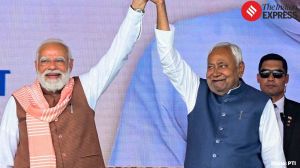What does Pakistan want from U.S. talks?
Top U.S. and Pakistani diplomats meet in Washington this week to discuss a range of issues from security to Pakistan's economy.
Top U.S. and Pakistani diplomats meet in Washington this week to discuss a range of issues from security,Pakistan’s economy,water and energy to education,foreign policy communications and agriculture. Here are some questions and answers on what Pakistan,a front-line state in the U.S. struggle against al Qaeda and religious extremism,hopes to get out of the talks:
WHAT’S AT STAKE FOR PAKISTAN?
In a word,relevance. Pakistan has a narrow window of opportunity to cement its position and capitalise on its usefulness to the United States regarding Afghanistan,India and the region as a whole.
While for years Afghanistan was dependent on Pakistan for its links to the outside world,it now is increasingly reliant on India,China and Central Asia for trade,which in turn reduces its formerly strong ties to Pakistan.
Indeed Kabul,post-Taliban rule,views Pakistan with great suspicion.
The Pakistani establishment knows the United States needs its help to create conditions favourable for the beginning of a U.S. pullout from Afghanistan next year. Pakistan still has influence with the Afghan Taliban on the one hand,and could crack down on the insurgents’ use of Pakistan territory for sanctuary on the other.
But the Pakistanis fear once the United States is out of Afghanistan — and Pakistan’s utility is reduced — the United States will cozy up to India,greenlight Afghanistan’s alternate links to the outside world and leave Pakistan isolated and encircled by hostile powers.
Pakistan’s challenge,then,is to leverage its current usefulness to the United States to attain long-term benefits that will last.
BUT WHAT ARE THESE BENEFITS?
Influence in Afghanistan,often touted as strategic depth against India; the denial of an Indian foothold on its western border; and economic and financial deals with the United States — most importantly,a civilian nuclear deal like the one India has.
Pakistan shares a large Pashtun population with Afghanistan,which it sees as deliberately under-representing Pashtuns in the Kabul government. Pashtuns make up the bulk of the Taliban insurgency on both sides of the border.
Pakistan fears its own Pashtun population could be further inflamed by developments across the border and worsen an already rampaging insurgency in Pakistan. Influence in Afghanistan would allow Pakistan to ensure the primacy of Pashtuns and tamp down the nationalist aspirations of its own tribal areas.
Pakistan also wants long-time rival India’s creeping influence checked before New Delhi expands more into Afghan markets and further boosts its influence with the Karzai government. Pakistan fears Indian troops on its eastern border and an Indian ally on its western one,seeing that as regional encirclement.
Getting the United States to temper India ambitions in Afghanistan is a primary goal of Pakistan as it seeks strategic parity with its giant neighbor.
Finally,Pakistan’s economy is gasping for foreign investment and crippled by massive power shortfalls. So Pakistan will ask for a civilian nuclear deal,a senior government official told Reuters in the days before the talks begin.
Pakistan is keen to demonstrate that it is a responsible nuclear power. Two days before the talks Pakistan filed a petition to reopen an investigation into nuclear scientist Abdul Qadeer Khan’s alleged smuggling ring.
The Pakistanis are also looking for new deals on trade and agricultural development.
WILL PAKISTAN GET ALL IT WANTS?
Probably not. A civilian nuclear deal is almost certainly not going to emerge from two days of talks. But agriculture and trade deals are already in the works,so those are more likely. Much of the talks will focus on security and fighting the Taliban.
The talks could lead to joint statements of renewed resolve in combatting terrorism and possibly even an arms deal to help the Pakistani air force combat militants in the tribal areas.



- 01
- 02
- 03
- 04
- 05




























